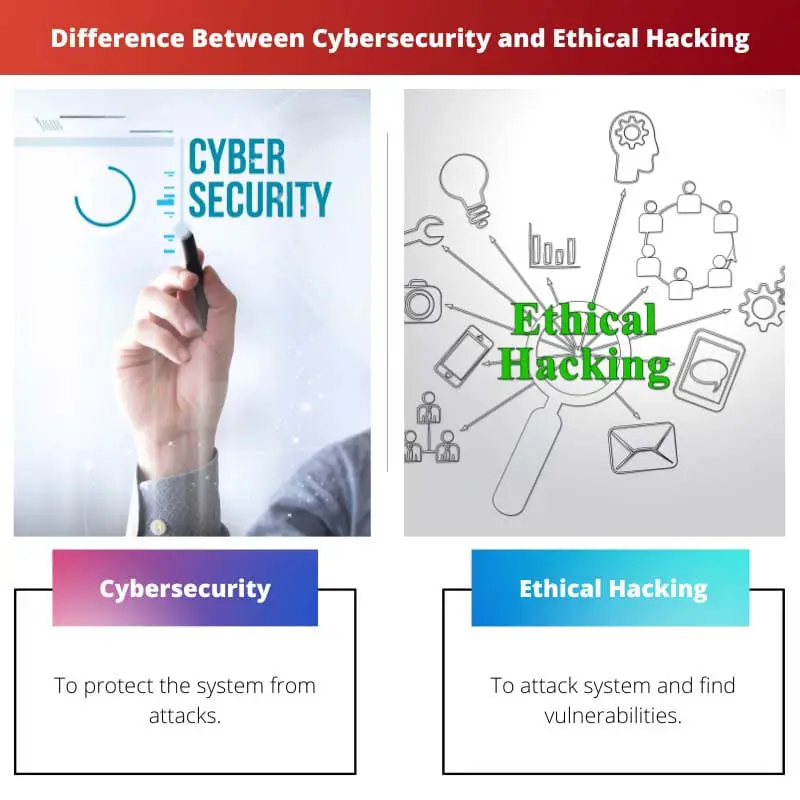As we are observing the unprecedented advancement of technology, a vast part of it includes making it safer for everyone. As soon as new technology comes, hackers and internet thieves find a way to exploit it and use it to their benefit.
It is the work of Cybersecurity Experts and Ethical Hackers to ensure the safety and sustainability of a system.
Key Takeaways
- Cybersecurity refers to protecting networks and devices from unauthorized access and attacks.
- Ethical hacking is a technique used to test the security of systems by simulating attacks.
- While cybersecurity is reactive, ethical hacking is proactive.
Cybersecurity vs Ethical Hacking
Cyber Security is monitoring security and protecting computer systems, networks and the data stored on them from malicious attacks. In cybersecurity you don’t have to hack into the system.In ethical hacking the hacker hacks the computer system, application or data to protect it.

Cybersecurity is the technique of safeguarding digital information like networks, programs and systems, from threats like phishing, ransomware, malware and social engineering.
The people who practise this technique are called Cybersecurity Experts and they are now an integral part of every company which uses the internet and technology.
Ethical Hacking is an offensive method used to discover vulnerabilities in an existing system. The term “Ethical Hacking” refers to the hacking done by white-hat hackers.
The motive of these ethical hacks is to find possible holes in the system before a black-hat hacker does. Ethical Hacking is one of the many practices used in Cybersecurity.
Comparison Table
| Parameters of Comparison | Cybersecurity | Ethical Hacking |
|---|---|---|
| Objective | To protect the system from attacks | To attack system and find vulnerabilities |
| Methods used | Access control, raise awareness, put a firewall, use a risk-based approach | Phishing, Session Hijacking, Sniffing, Social Engineering, Cryptography, etc. |
| Work intention | Defensive | Offensive |
| Regular job | To maintain and update the system and do security audits | To test the system daily and report to system admin |
| Roles | Security analyst, SOC engineer, etc. | Penetration tester, security manager, etc. |
What is Cybersecurity?
Cybersecurity is the process of using defensive methods to ensure the safety of computers, electronic systems, networks, mobile devices, servers and data from virtual threats.
These threats include phishing attacks, distributed denial-of-service attacks, socially engineered attacks, etc.
There are four phases of Cybersecurity: Identify, Protect, Detect and React. In the first phase, Cybersecurity Experts identify possible vulnerabilities and loopholes in the system.
Then, they protect the system by erasing these weaknesses and making it strong. The third phase is to monitor and detect any unauthorized activity in the system.
In the fourth phase, Cybersecurity Experts react to the attacks and try to restore the system to a safe state.
Cybersecurity Experts work daily to maintain and upgrade the system. They design and perform daily audits to check for breaches or data leaks and when they find it, they further research to find the cause and then to salvage it.
The aim is to remain one step ahead of an attacker and prevent any attacks. But, if an attack happens, then the aim is to reduce the loss to keep it minimal.
The techniques used by Cybersecurity Experts include developing a strong network and monitoring it, using password auditing tools, raising awareness about cyberattacks, encrypting the data and more.

What is Ethical Hacking?
Ethical Hacking is the operation of exploiting a system, application, network or organization’s interface with the owner’s permission.
The purpose of these attacks is to detect vulnerabilities and cure them so that someone with a bad intention can’t enter inside the infrastructure and utilize it to perform wrong tasks.
The five phases of Ethical Hacking are: Reconnaissance, Scanning, Gaining Access, Maintaining Access and Clearing Tracks. During the reconnaissance phase, hackers try to collect the maximum information about the victim.
In the scanning phase, they use tools to find vulnerabilities and other weak points in the system. Then, the hacker tries to gain access to the system using any and every method.
After they gain access, the next challenge is to maintain the access which is the fourth phase. When they have maintained stable access and performed all their desired tasks, the next step is to clear tracks.
They clear all the footprint and metadata to make sure that no one finds out about the unauthorized exploit.
The various techniques used by Ethical Hackers are network & port scanning, social engineering, sending fake emails to employees to find out who is likely to fall prey to real attacks.
Ethical Hackers also use dictionary attacks, malware, Trojan horses, phishing and other methods to check a system’s strength.

Main Differences Between Cybersecurity and Ethical Hacking
- Cybersecurity is the process of using protective methods to ensure the safety of a network. On the other hand, Ethical Hacking is the procedure of exploiting and finding weak spots in a system.
- Cybersecurity is a defensive process whereas Ethical Hacking is an offensive process.
- The methods used by Cybersecurity Experts include designing and developing high privileged access, educating the employees, building a strong firewall, etc. Methods used by Ethical Hackers include phishing, social engineering, session hijacking, etc.
- The job roles for Cybersecurity Experts include security analysts, SOC engineers, etc. Whereas, the jobs offered to Ethical Hackers are a penetration tester, security manager and others.
- The regular job of Cybersecurity Experts is to update the system and perform security audits. The regular job of Ethical Hackers is to attack a network to find the vulnerabilities and later report them to the system admin.

